- Home
- Adam Thorpe
The Standing Pool Page 30
The Standing Pool Read online
Page 30
He picked the bottle up. A 1985 St-Émilion.
‘Smells corked,’ he said.
‘You never took me skiing.’
‘I didn’t like skiing.’
‘You still went skiing with your friends, right?’
‘Your mother didn’t want you to go. She objected. You’ll have to replace this bottle, corked or no.’
Jamie nodded. ‘Your version.’
‘There’s still time. I did offer.’
‘Like once.’
‘Better than never. You weren’t interested. In fact, like your mother you ideologically objected.’
The little round sunglasses made Jamie look like a rock star being interviewed. His father saw himself in them, tiny and old. He told his son to switch off the lights when he was finished. He put the bottle down and took a sip from Jamie’s glass, the ruby pocked by fragments of cork. A gorgeous berry richness disfigured by a zigzag of vinegar.
‘Pity,’ he said.
‘Finished with what?’
‘Being down here,’ Nick mumbled, already tackling the stairs. One day they and their ilk would be impassable, the worst face of the Eiger. Maybe in under thirty years. He would have made Jamie pay for that bottle. He would have done, if it hadn’t been corked.
‘I know who killed him,’ said Jamie.
He could see the top of his son’s head in the murk of the under-lit room, the retied tribal knot like something on a bird, a suggestion of another socio-economic system, of causewayed enclosures and men coerced into building giant henges. It was unsettling.
He had to whisper it from halfway up, a harsh rasp that stirred his pseudopolyps: ‘Killed who?’
‘The guy who fell off the roof.’
There was a sudden, unearthly scream from the girls’ bedroom. ‘We’ll discuss it tomorrow,’ said Nick, over his shoulder.
His hunch was correct: Alicia had been teasing the few sleepy wasps crawling about in the crack. Ointment from Sarah’s emergency bag was applied. So was the tape. Alicia snivelled, stung on the finger. Beans wanted one, too. Tammy giggled away, for some reason.
The parents retreated into their bedroom’s blackness. Sarah was a soft ledge of warmth Nick settled against. ‘Jamie’s downstairs. Stoned out of his head,’ he told her, in a low murmur. ‘Scratched his cheek. He’s nicked one of Alan’s bottles.’
‘Jesus.’
‘It’s OK,’ he smiled. ‘It was corked.’
‘But that’s out-and-out theft.’
‘He won’t stay much longer, in that case.’
‘The triumph of individualism,’ she remarked softly, without turning. It might have been a shred of her sleep.
He stroked her edge, the child’s landscape of her dip and curve, reaching the end of her nightie on a stretch of cool thigh, the knobble of bone at the side of a knee, like a bared boulder; stubble-fields of calf where she had recently shaved. The shin bone’s exposed, asexual ridge. Unlike the foot. Sarah had beautiful arched feet. Its succulence underneath. He reached the summit of the little toe, the piled cairn. She flicked it out of his fingers, mewing her complaint.
‘Love you,’ he said.
‘I’m sleepy.’
Sleepy was good: there was reconciliation in the word. Tired would have been bad.
‘Maybe too sleepy,’ she said, turning over to face him. He started exploring down below, nevertheless. ‘I ought to go to Aix again, soon,’ she added, following her thoughts. ‘I’m in need of documents.’
His own thoughts that night were industrious, a big noisy factory above the river of dreams. He wouldn’t be carried away. He was vaguely envious of Jamie knowing something more about the builder, but it might be hogwash, empty rumour. The shepherd was the poor man’s brother; he had said nothing about a murder, only that he’d slipped off when it was wet, that you should never go up on a roof when it was wet. Unless his local accent had concealed something more in the interstices.
Jamie had been conducting some oral research, clearly. Original research. He had the time. Nick felt disgruntled about this. Original research had always been his Achilles heel: when he was young, it was theory that had dominated. You sluiced the dense matter of facts with the clear, invigorating waters of theory, Marxist or otherwise. It left him, now, with this traceable fault-line in his work, the fracture in his collected essays that might bring the whole arch tumbling down. Peter Osterhauser had no such fault-line: his very strength was the original research, its depth and breadth, each fact counter-checked and substantiated over and over. Once every ten years Peter Osterhauser would publish something remarkable, unassailable, with a great weight of learning that others marvelled over. Just when Nick felt his colleague had dried up, the waters came gushing forth and the world stood still. This was why Peter had been appointed professor, although he was not yet fifty. Even that stung.
After an hour or so he got up and opened the window. It was a clear, moonless night. The stars massed more thickly and then thicker still the longer he looked, their prehistoric glitter rendering even time’s passage futile. Orion the hunter.
Venus a reddish-blueish sparkle. The owl or whatever was still beeping over and over, a hoot like an alarm clock, hardly animal. Otherwise it was silence, and there were no man-made lights. It might be Africa, he thought. The fragrant night air had a touch of warmth to it, a hint of the heat to come in a matter of weeks. He recalled a research trip he’d made for his thesis to the eastern highlands of the Bamenda peoples; not the wet, viscous air and thick forests of the coastal valleys but dry heat and horizons; short and feathery grass-cover in which he’d knelt one early morning and felt fulfilled.
An hour or so passed – very fast, as sleepless hours always do. He lay in bed and smiled grimly into the darkness as Sarah breathed evenly in sleep. All thoughts at this hour were crap. The moment you were born they handed you a spade to start digging your own grave.
The distant screams continued: harrowing, agonised, bewailing the ruin made of the world. He surfaced from a dream of screaming, pug-like faces with dirty teeth, like something out of Tolkien. Sarah was already awake: he clawed for the lamp and when it came on she looked bewildered.
It was two-thirty in the morning. Somebody was being stabbed. The kids.
Oh yes. The wasps, of course.
Sarah came back from her investigation while he was finding his feet. ‘The kids are fine,’ she said.
They listened. The hellish screams reminded Nick of something. A farm near his school, its dark and solid smell wafting over the playing fields. Smoking in a wintry hedge, sharing a delicious Number Six with his best friend Duncan, feeling huge and adult and furtive near the piggery. Heat and cold.
‘The boars,’ he said. ‘The electric fence.’
‘That’s what I thought, maybe. It’s horrible. They’re in pain.’
They listened. Tortured souls touched by fire, racked on griddles, dismembered with rusty handsaws. Hog-headed sinners.
‘They’re cross, more like. I guess they’ll learn, soon. Pigs are rather bright.’
There was a final screech that tore into bits, whisked away like embers. Then silence.
‘You see? They’ve departed. Somewhat irritated,’ he said, his legs trembling under the duvet.
‘We could put one round the pool,’ suggested Sarah.
‘Erm, I think not. Anyway, it’s too low. False security is the worst.’
Beans jabbered next door, singing an intermittent dirge to her cot’s overcrowded soft-toy population above the synchronous owl hoot. Neither Alicia nor Tammy had woken up.
Nick felt a vague wake of discomfort at having agreed to switch the fence back on. The Sandlers were definitely the gods. Something mischievous and cruel. And Jean-Luc? If he were to look down at Jean-Luc’s ankles he would see little wings on them. Hermes, who could pass through walls and alight anywhere; who guided the dead souls to the ferry-boat.
Oncle Fernand is very pleased with his nephew.
Jean-Luc spends t
he weekend, when he isn’t staring into the river by his fishing rod or deep in a Spirou, working on the monument. He’s only just realised – in the middle of the night, blinking into the darkness – that the monument is to Oncle Fernand. That is now its official name. The Monument to Fernand Maille. It was staring him in the face. He imagines the unveiling ceremony, with the mayor, the conseil municipal, the President of France. Of course this is a fantasy: he will never show it to anyone. The very idea makes him feel sick.
He also thinks of it as a bird, because of the feathers stuck along the handles. Oncle Fernand had fifty chickens, it was always said. His brother – Jean-Luc’s father – thought chickens were stupid, demonstrating the fact in the usual way when one had to be slaughtered: headless, it still ran about.
Oncle Fernand, however, was different; he nursed a mutant chick with huge feet and a crooked spine and miniature wings. It lived a year and when it died Oncle Fernand cried, apparently. He was twelve. His father – Jean-Luc’s grandfather – was very worried by his boy and beat him, saying everything, good and bad, was merited. These were the stories that Jean-Luc was brought up with.
This isn’t a monument, this is Oncle Fernand’s mutant chick, Jean-Luc tells himself, laughing inside his head. The resurrection of the mutant chick.
He writes this out carefully in pencil on a piece of cardboard torn off a box. La résurrection de la poule mutante. Because it makes Oncle Fernand so happy, he glues the strip of cardboard along the side of the monument, from wheel to wheel. He doesn’t like the look of his careful handwriting, it reminds him of school exercises and is still uneven, but he leaves it.
He doesn’t know what to do with the photographs. He hasn’t looked at them again since the woods, yesterday. Just looking at the plastic envelope scares him. It’s because of Raoul Lagrange, hovering in the background. You can’t get rid of ghosts, just like that. You can’t shoot them, or make them transparent by adding chemicals, or keep them out with an electric fence.
He has a rival in love. It is like a Johnny Hallyday song. He has five Johnny CDs but the one he chooses now is the tape of best hits that he bought from the stall at St-Maurice five or six years ago. He opens his old tape recorder and puts in the cassette. He has to blow the dust off, and the side of the tape recorder is scotched up with tape that’s peeling away, but the music still plays. He knows it all by heart, anyway: it’s not Johnny promising his eyes when she can’t see any more, the salt from the kisses of his mouth … it’s Jean-Luc Maille. It’s the honey from the touch of his own hand. It’s his blood that is the same as hers, that is over and above any difference between him and her, between him and the Englishwoman, because face to face they resemble one another, we are blood for blood the same, we are just the same –
There is moaning from next door. A shout. He checks by putting his ear to the door. You never know. Last year she fell out of bed and fractured something and the bad-tempered nurse – not Elodie, back then – told him off for not responding to her cries. ‘I wouldn’t have a minute to myself if I did,’ he replied. The nurse told him he’d regret it, after, when his mother was gone for good.
‘I’m trying to sleep, stupid!’
‘Too bad,’ he shouts back.
‘You’ll kill me! I’ll call the police!’
‘After I’ve killed you, or before?’
She goes silent at that. He’s noticed that sometimes he gains the upper hand. Perhaps he scares her with his jokes.
As the tape plays Johnny’s best hits, Jean-Luc hangs the old greenish soup spoons by wire from the pink plastic handle; they are flowers on the bush, and you can see your face in a spoon. He used to make faces in his spoon, when he was small. His face all swollen and comical. He could cut out little faces from the magazines in his drawer and glue them into the bowl of each spoon, but he needs the Englishwoman’s face, close up, for the prettiest flower. The one that made him smile in the picture book, when he was a little boy at school. He nips the wire with his red pliers: a satisfying click, each time.
And where is he going to find the Englishwoman’s face, without asking her to pose? The face on the photos he took was too small each time.
Unless he cuts out the photo of her naked, standing by the pool, and sticks that on instead. Her whole body instead of her face. This idea appeals to him more and more. She’ll be safe in the spoon, the heart of the flower. But the envelope scares him. It’s because of Raoul Lagrange, standing at the back in his blue overalls, straining to lift his head on its broken neck. Watching, watching through eyes as white as the pieces of gravel the girls gave him. His rival in love. And he can’t do anything about it: you can’t get rid of someone who’s already got rid of.
He sticks two of the pieces of gravel on the ends of the pink handle, holding each in the glue until it’s dry enough and his finger aches. The duck has eyes, he laughs to himself. Blind eyes. The eyes of the dead. It has to have the dead on it, being a monument.
He picks up the scissors, mustering his courage. But he’s frightened to open the envelope. It’s too strong.
His mother calls him again with a whine like a tom-cat on heat. It is Sunday morning, the nurse has been and gone, and now it is up to her son. The whine won’t stop, she’s thirsty, for a week now she hasn’t been able to get down the stairs because of some kind of feebleness in her legs, and has only shuffled around her room once or twice.
He still has the scissors in his hand when he goes through. She’s sitting in the winged easy chair, where the nurse left her.
‘All I want is a glass of water,’ she moans. ‘My throat’s as dry as a biscuit.’
‘There’s water on your bedside table.’
She grimaces and shakes her head, the folds of her throat wobbling like a chicken’s. ‘It’s last night’s.’
‘Water doesn’t go off that quickly,’ he says, picking it up. He is saying things for the sake of it, he isn’t really concentrating, his mind is on the monument. ‘We could boil some white marrube flower in it,’ he says. ‘Clear you out. Spring cleaning.’
She grimaces. Jean-Luc wants to grimace, too. Every spring until he was eighteen, over three dreaded mornings before school, he’d been forced to drink an infusion of marrube, the bitterest drink there was, as his grandmother had made Maman do – to purge the liver, to clear the blood. They’d pick the ugly flowers in the summer in the hot fields below Aubain to dry over the winter and they would both grimace as they found them, they couldn’t help it, it was memory working, it was the bitterness that had remained in their heads.
‘It’d kill me,’ she says, and immediately regrets it from the look of her.
He puts the glass down, remembering those harvests in the hot fields, the sun on his neck, the scents, the rush basket full of leaves and flowers, the sight of her skirt and her laddered, vein-knotted calves. She’d always wear the same blue working skirt, day in, day out, summer, winter. It smelt like a goats’ pen. On the wall is his present to her when she was sixty: a duck in ceramic, with a bamboo frame. A real artist did it, selling stuff from his studio in St-Maurice. He was Dutch and wore a beret. She liked it. It was very well done, you could see the exact feathers, what type of duck it was: a mallard. He was glad she liked it. He was twenty, then.
‘Why’ve you got those scissors?’ she asks, with the same scared look.
‘I thought you might need a haircut,’ he smiles.
She crouches in the chair, her small, square-shaped body turning even smaller. Her hair is stuck patchily to her skull and cropped every month by one of the nurses. It looks like a worn flannel over her head; she strokes it. ‘You’re not touching it,’ she says, as if guarding a treasure.
He laughs. He didn’t even notice the scissors in his hand when he came into her room. He has a great urge to cut off all her hair, to take it back to the spotted skull. A nurse washes that balding head every week over the plastic bowl, as if they are in a proper hairdresser’s; a towel draped around his mother’s neck, the jug filled
up in the tiny bathroom next to the kitchen. Up and down, up and down, the nurse goes. Much easier to have it all off.
‘Much easier to cut it all off,’ he says, smiling. He comes up to her and snips a curl above her ear. It lies in his hand like a tiny clump of fir needles. He shakes it away and it vanishes against the grey linoleum that was once patterned with blue and red spots.
‘Murderer,’ she whispers, her eyes expanding in their creased sockets.
‘I haven’t murdered anyone, Maman. But I’ll murder you if you carry on like this.’
‘I bet you would, too!’ She looks both terrified and defiant, shrinking into the chair with its bald patches and grease stains as if she might melt into it, become the chair itself. One day the chair will be empty, and then what will he think?
It would be so easy, he realises. A quick plunge of the scissors into her chest, then another to make sure. Or into the throat, like the shepherds do with their goats or their sheep, slowly but firmly pressing the blade into the windpipe. Jean-Luc’s father showed his boy how to do that, when they’d a few goats up at the back, the flies and the smell filling the kitchen.
She tripped up a few years ago and hit the radiator: blood spurted from the side of her head like a drinking fountain. He held his thumb against it until the ambulance arrived. The strange thing was, she’d carried on chatting to him, in a good mood, or maybe knocked into sense. Things were better then.
But Oncle Fernand is telling him not to be stupid, to go and get her a glass of fresh water. He has far more important actions to perform than putting his mother out of her misery. Or cutting off what’s left of her hair.
He comes back to Les Fosses on his mobilette to check the fence. He’s on his way to the Dutch couple’s kidney dish of a pool and makes a small detour to see whether the fence has done its work. He half expects to see electrocuted boars littering the yard.
No one about, although it is mid-afternoon. The seeds lie like rice over the earth, blackened by heavy watering. Almost April, everything bursting out already, the cardousso on his own door as open as it can get, the time for sowing long past but he couldn’t not have tried. He’d be fired, otherwise. Madame Sandler was quite clear about that, although he doesn’t always believe her. But these people would be reporting back: she has spies, now. She’d realise he isn’t pulling his weight, that he’s been pulling the wool over her eyes for years. He hasn’t been, in his own mind, but that’s how she’d see it.

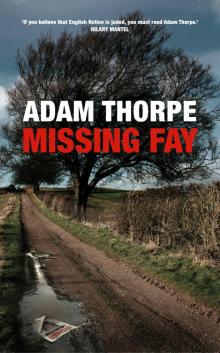 Missing Fay
Missing Fay Hodd
Hodd Pieces of Light
Pieces of Light The Standing Pool
The Standing Pool Ulverton
Ulverton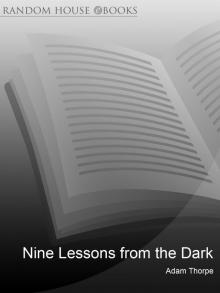 Nine Lessons From the Dark
Nine Lessons From the Dark Flight
Flight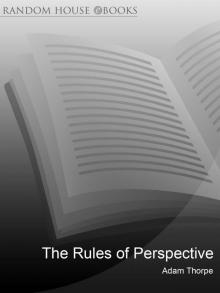 The Rules of Perspective
The Rules of Perspective From the Neanderthal
From the Neanderthal Is This the Way You Said?
Is This the Way You Said? Still
Still No Telling
No Telling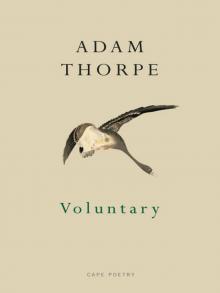 Voluntary
Voluntary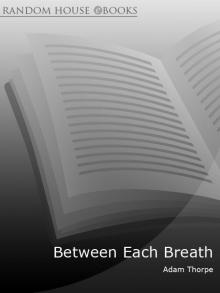 Between Each Breath
Between Each Breath